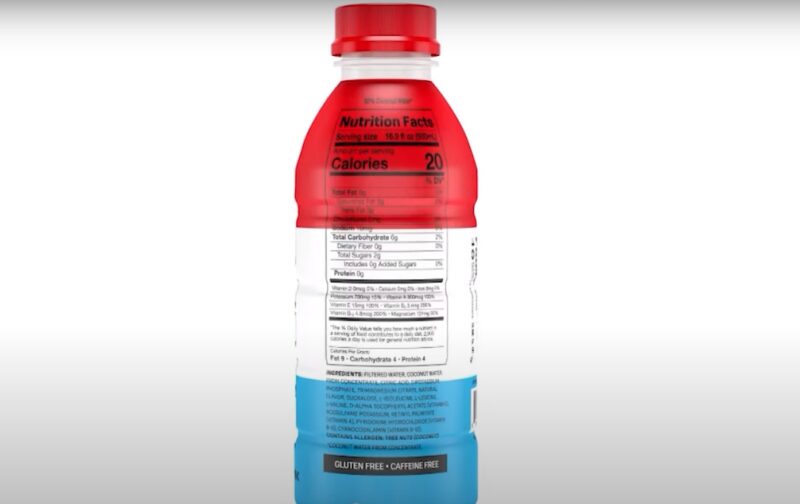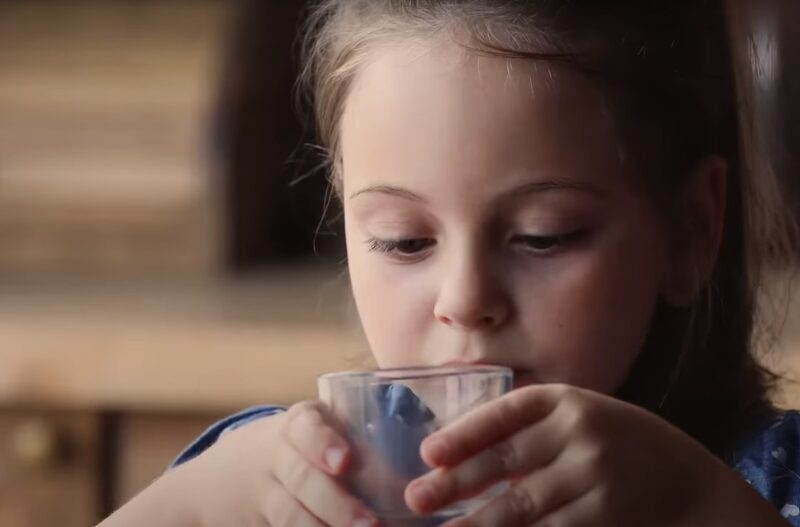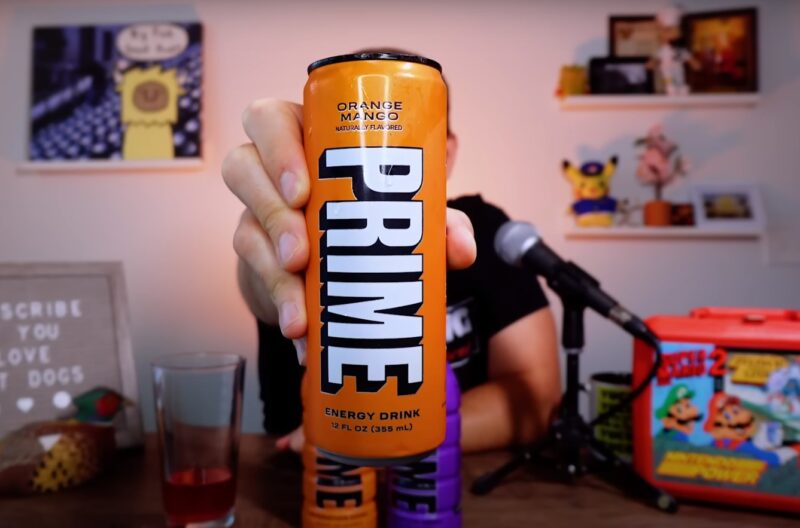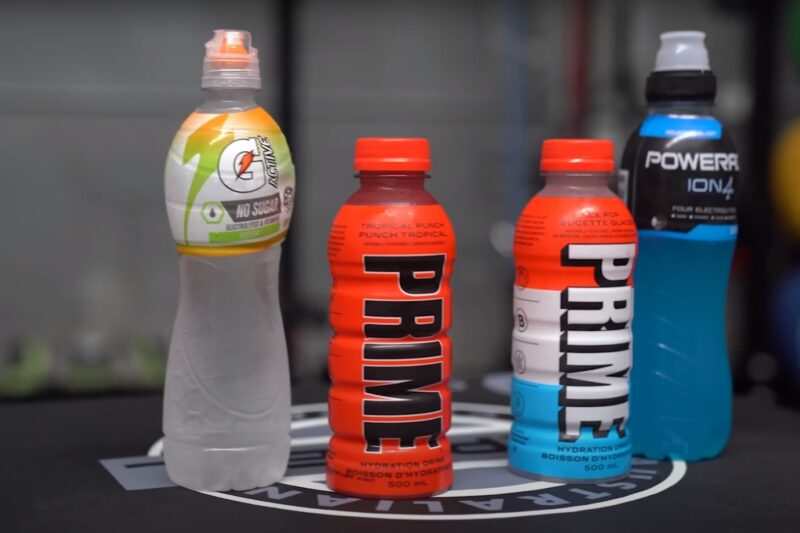Prime sports drinks have surged in popularity among the younger demographic, notably due to their association with YouTube influencers Logan Paul and KSI. This popularity has led to some unintended consequences, such as bans in schools where students were found selling these drinks on campus.
The Prime brand offers two main products: Prime Energy and Prime Hydration. While both have found a place in the market, their contents, especially regarding caffeine, have raised concerns among parents and health professionals alike. Today, I would like to shine a light on Prime Hydration and its main ingredients and compare it with Prime Energy.
Key Takeaways:
Caffeine Content in Prime Hydration

Prime Hydration has found its niche in the market of sports and energy drinks by offering a formula that is devoid of caffeine. This move sets it apart from Prime Energy, its sibling product, which contains a significant amount of caffeine, equating to roughly six cans of Coke per 12-ounce can.
The absence of caffeine in Prime Hydration is a factor that makes it a more child-friendly option. Given the well-documented concerns surrounding caffeine consumption by children and adolescents—ranging from sleep disturbances to increased anxiety and heart palpitations—the caffeine-free nature of Prime Hydration could be seen as a responsible formulation choice.
AACAP guidelines advise against caffeine intake for children under 12, underscoring the importance of such caffeine-free alternatives in the market.
Ingredients and Nutritional Concerns
While Prime Hydration avoids numerous pitfalls with its ingredients, let us check them out.
| Ingredient Type | Examples in Prime Hydration |
|---|---|
| Base Liquid | Water, Coconut Water |
| Sweeteners | Artificial Sweeteners (e.g., Sucralose) |
| Vitamins | Vitamin A (as Retinyl Palmitate), Vitamin E (as Alpha-Tocopherol Acetate), B Vitamins (e.g., B6, B12) |
| Electrolytes | Potassium, Calcium, Magnesium |
| Acidity Regulators | Citric Acid |
| Flavorings | Natural and Artificial Flavors |
| Colorings | Depending on the flavor, may include natural or artificial colorings |
| Preservatives | To extend shelf life and maintain product stability |
Health Implications for Children

The guidance from the American Academy of Child & Adolescent Psychiatry regarding caffeine consumption underscores a critical aspect of pediatric nutrition: the necessity of judicious beverage choices for children.
This advisory is particularly relevant in today’s market, where products like Prime Hydration are gaining popularity among younger demographics. Despite its caffeine-free formula, Prime Hydration introduces other components that warrant a closer examination for their potential impact on children’s health.
Artificial sweeteners, a feature in Prime Hydration, present a complex dilemma. While they offer a sugar-free alternative, potentially curbing the risks associated with high sugar intake, such as obesity and dental cavities, their safety and long-term effects on children’s health remain areas of active research.
Concerns have been raised about artificial sweeteners possibly altering taste preferences in children, leading them to favor overly sweetened foods and beverages, which could detract from the consumption of nutritionally rich foods.
Furthermore, emerging evidence suggests that these sweeteners might affect gut health and glucose metabolism, though the implications of these findings for children’s health are not yet fully understood. Branch-chain amino acids (BCAAs), another ingredient found in Prime Hydration, are often touted for their muscle-building benefits.
However, the necessity and safety of supplemental BCAAs for children are debatable. Children’s diets, when balanced and adequate in protein, naturally support growth and muscle development without the need for supplementation.
The inclusion of BCAAs in beverages marketed to children might not only be unnecessary but could also contribute to an unbalanced intake of amino acids, with unknown long-term health implications.
Prime Hydration vs. Prime Energy

Prime Energy and Prime Hydration, while originating from the same brand, diverge significantly in their intended consumer use and ingredient profiles.
| Feature | Prime Energy | Prime Hydration |
|---|---|---|
| Caffeine Content | 200 mg per can | Caffeine-free |
| Sugar Content | Contains sugar alternatives | Sugar-free |
| Artificial Sweeteners | Yes | Yes |
| Vitamins | Contains vitamins | Fortified with vitamins A, E, and B vitamins |
| Target Audience | Adults and individuals seeking an energy boost | Individuals seeking hydration without caffeine |
| Suitability for Children | Not recommended | Debatable, due to artificial sweeteners and vitamins |
| Primary Use | Energy enhancement | Hydration |
Recommendations for Children’s Hydration
The simplicity and purity of water cannot be overstated when it comes to children hydration. As the most natural form of hydration, water is unparalleled in its benefits—it’s universally accessible, cost-effective, and devoid of any artificial additives or excessive vitamins that could pose health risks.
This makes water the unequivocal choice for daily hydration needs, especially for children whose developing bodies are more susceptible to the adverse effects of sugary and artificially enhanced beverages.
However, the hydration needs of children can vary, particularly for those participating in elite-level sports or engaging in prolonged physical activity. In these instances, replenishing lost electrolytes becomes as important as hydration itself.
While commercial sports drinks are often marketed for this purpose, they come with their own set of concerns, including the presence of artificial sweeteners, flavors, and potential vitamin toxicity from over-fortification.
A more balanced approach to hydration and nutrition is to opt for homemade sports drinks or natural coconut water. Homemade sports drinks, made with natural ingredients like lemon juice, a pinch of salt, and a natural sweetener like honey, can provide the electrolyte replenishment needed without the unnecessary additives found in commercial products.
These homemade concoctions allow for control over the ingredients, ensuring that children receive the hydration and electrolyte balance needed to support their activity levels without the health risks associated with processed alternatives.
FAQs
Who owns Prime?
Prime is co-owned by social media influencers and entrepreneurs Logan Paul and KSI (Olajide Olayinka Williams “JJ” Olatunji).
Why is Prime so famous?
Prime has gained fame due to its association with its high-profile founders, Logan Paul and KSI, who have a massive following on social media. Their marketing efforts, combined with the brand’s positioning as a healthier alternative to traditional energy drinks, have contributed to its popularity.
Who invented Prime?
Prime was invented by Logan Paul and KSI, who collaborated to create and launch the brand and its products.
Has Prime got alcohol?
No, Prime does not contain alcohol. It is marketed as a sports hydration and energy drink brand, focusing on providing caffeine (in Prime Energy) and electrolyte-based hydration (in Prime Hydration) without alcohol content.
The Bottom Line
The rise of Prime sports drinks, fueled by celebrity endorsements and social media influence, has brought attention to the importance of choosing suitable hydration options for children.
While Prime Hydration offers a caffeine-free alternative to traditional energy drinks, its content of artificial sweeteners and synthetic vitamins warrants caution.
Parents and caregivers should prioritize water and natural hydration sources to ensure the health and well-being of their children, reserving sports drinks for those participating in high-intensity sports under professional guidance.
If you’re interested in similar subjects, be sure to visit our website.

